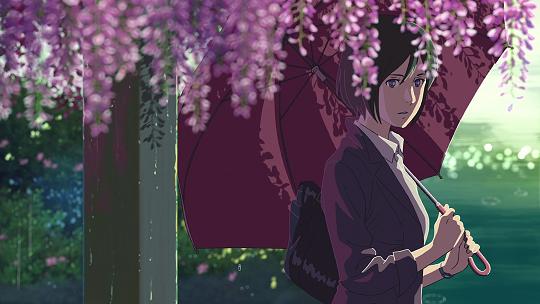
“Hmmmm.” That was the noise I made as the post-credits scene in Makoto Shinkai’s Kotonoha no Niwa (Garden of Words) faded to black. It wasn’t so much a question or even a measure of concern but more a noncommittal sound that seemed to fit with the rather woolly way the petite forty five minute film ends. Ordinarily at the end of Shinkai film, even one as short as Dareka no Manazashi (Someone’s Gaze), there’s a satisfied silence, pregnant with the weight of the story just told and the characters just glimpsed.
Pluviophiles rejoice for much attention is lavished on the rain
A lot of the discomfort with the ending will likely come from what expectations you had going into it - in short whether you’re familiar with Shinkai’s films or not. Certainly you should take each work on its own merits, but the sharing of motifs and style and tone is enough to sink you back into the amber sunsets and cloudscapes first set out in Hoshi no Koe (Voices of a Distant Star).
Read the rest of this entry




Words seem almost inadequate when trying to convey the wistful nostalgia evoked by 5 centimeters per second. Every scene in the petite one hour movie is visually arresting, the sparse dialogue secondary to the unspoken emotion loaded into each moment; it is beautiful, moving and amazingly personal film. Separated into three chronologically sequential stories, the film follows Takaki Tohno and his relationship with childhood friend Akari Shinohara.
each sky, each train car, each snow swept vista is beauteous and beyond the capabilities of real life to produce
The first story, Oukashou, comprises Takaki's fraught train journey to see Akari after they were separated due to parental employment. Occupying the bulk of the movie's timeline, the subtext of distance and solitude will be instantly familiar to anyone who has seen Makoto Shinkai's previous works: Voice of a Distant Start (Hoshi no Koe) and The Place Promised in our Early Days (Kumo no Mukou, Yakusoku no Basho). Even in such a short time-frame, Takaki's journey is sentimental and emotive, cutting straight to his fears and expectations unconcerned with exterior bravado. Scene by scene, poise and grace is established by valuing silence as much as dialogue and the ever present melody of the piano. The first story culminates in a serene landscape of snow and darkness before Takaki heads home in the fresh morning sunlight, starting the narrative cycle once more with the second and then third stories.
Read the rest of this entry




